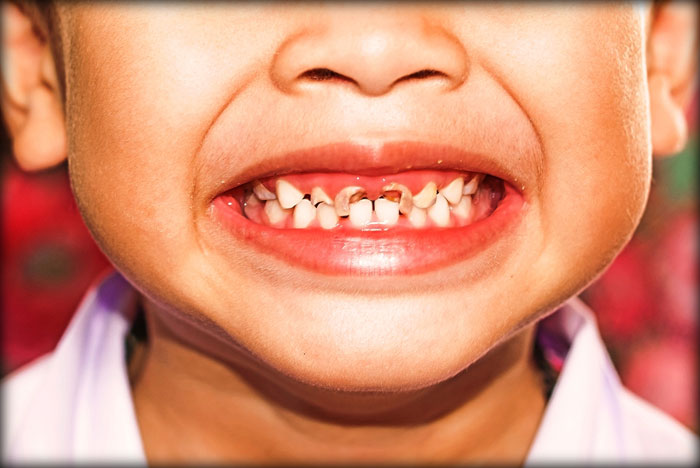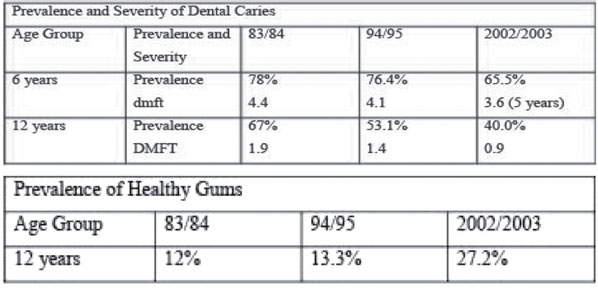|
Chronic dental problems:
A child’s worst nightmare
by Carol Aloysius
 Did you know that paediatric dental disease, also referred to as
childhood tooth decay, is often referred to abroad, as the number one
chronic childhood illness? Left untreated, childhood tooth decay can
have devastating consequences that extend beyond the dental chair.
Rampant decay can negatively impact a child’s overall quality of life,
inhibit their cognitive and social development and compromise their
growth, function and self esteem. Did you know that paediatric dental disease, also referred to as
childhood tooth decay, is often referred to abroad, as the number one
chronic childhood illness? Left untreated, childhood tooth decay can
have devastating consequences that extend beyond the dental chair.
Rampant decay can negatively impact a child’s overall quality of life,
inhibit their cognitive and social development and compromise their
growth, function and self esteem.
Studies in the US show how negatively tooth decay can impact on the
life of a young child. It affects his/her growth, can lead to
malnourishment, bacterial infections and sometimes emergency surgery,
putting the child’s life on the line. According to data:
* Paediatric dental disease is 5 times more common than asthma and 7
times more common than hay fever.
* Left untreated, pediatric dental disease can lead to
malnourishment, bacterial infections, required emergency surgery and
even death.
* Pain and infection caused by tooth decay can lead to problems in
eating, speaking and learning.
* Dental disease has been linked to heart disease, stroke, diabetes,
pneumonia, poor pregnancy outcomes and dementia.
* Health care specialists in US believe that dental care is the most
prevalent unmet health need of children in the United States. Recent
data reveals: An estimated 16 million children in America have untreated
tooth decay; more than 51 million school hours and 164 million work
hours are lost each year due to dental disease, leading to increased
educational disparities and decreased productivity. And only 1.5% of 1
year olds have had a dental office visit compared with 89% who have had
an office-based visit with their physician.
* How does Sri Lanka compare with these gloomy figures?
* A limited study of dental caries conducted in the Ragama Medical
Office of Health area, of some 410 pre-school children aged 2-5 years
attending child welfare clinics recruited for the study in the Gampaha
district reveals the following: The survey was conducted by two medical
researchers in 2012 and is worth quoting, as it gives new insights into
the problem .
The results revealed that none of the children included in the study
had a routine visit to a dentist, although practices related to tooth
brushing were satisfactory. Prevalence of dental caries gradually
increased with age to reach 68.8% by 5 years.
Mean total decayed-extracted-filled (deft) score for the whole sample
was 1.41 and significant dental caries index (SIC) was 4.09. Decayed
tooth were the main contributor for the deft score and Care index was
only 1.55. Girls had a significantly higher prevalence of caries than
boys, it said.
To get more insights into the problem, the Sunday Observer spoke to
Community Dental Surgeon, Dental Unit, Health Ministry, Dr A.M Uttara
Amilani.
Excerpts…
Dental problems in children have soared in recent years.
Can you give an estimated figure of the number of schoolchildren with
dental problems in Sri Lanka
 Q: Has there been a national survey? When? Q: Has there been a national survey? When?
A. According to the National Oral Health Surveys conducted in
Sri Lanka in 83/84, 94/95 and 2002/2003, prevalence and severity of
Dental Caries has shown an overall declining trend.
Q: It is said, paediatric diseases (Dental Decay) are five
times greater than asthma and 7 times more than hay fever in the UK.
Your comments?
A. Yes
Beside the world burden of dental decay, more than half of the Sri
Lankan child population has experienced tooth decay. According to the
third National Oral Survey Report of 2002/2003, the prevalence of tooth
decay among five year olds is around 65%.
Q: What is the cause for this increase? Too many sugary foods?
Junk foods?
A. Tooth decay is closely related to oral health related
behaviour. The frequency and amount of sugary /junk foods play an
important role in developing dental caries. Eating sugary foods, junk
foods, and taking sugary drinks is definitely a predecessor of dental
caries in children.
Q: How early in life does a child develop a dental problem?
A. Tooth decay can start as early as the age of around one and
a half to two years.
Q: Can genes play a role in dental problems?
A. Still we don’t have scientific evidence regarding this
matter.
Q: What about thumb sucking, lip sucking, tongue thrusting and
other habits that can also wreck your teeth in early childhood?
A. These behaviours can induce malocclusion.
Q: What are the most common dental problems you see in
children in Sri Lanka today? Are they different from those in the past?
How and why?
A. Dental decay and gum diseases are the most prevalent oral
diseases among children. However, the prevalence rates are now
declining.
Q: Why?
A. Because of the introduction of the Fluoride which is the
most important substance which helps in preventing tooth decay via the
Fluoridated tooth paste in Sri Lanka.
In addition to that, this declining trend may be a result of the
awareness raising by the Ministry of Health via health education
materials such as, posters, leaflets, lectures, health talks to the
public.
Q: Many children today are losing their milk teeth early due
to poor oral habits. What are the reasons?
A. Dental decay is the most common reason for losing milk
teeth in early life, due to poor tooth cleaning habits and unhealthy
dietary habits.
Q:Is tooth decay( dental caries) a common problem? What is it?
How is it caused?
A. Tooth decay is a common problem in all age groups in Sri
Lanka according to the third National Oral Health Survey report in
2002/2003.
The prevalence of Dental Caries among 5 year olds was around 65% and
around 40% among 12 year olds.
The prevalence of Dental Caries among 15 year olds was around 52% and
around 90% among adults and 71% among the elderly group.
Our mouths are full of bacteria, some bacteria are helpful but some
can be harmful, such as those that play a role in tooth decay process.
Tooth Decay is the result of an infection with certain types of bacteria
that use sugars in food to make acids. Over time, these acids can make
cavities in teeth.
Q:How do you treat an infected tooth?
A. Decayed teeth are restored with restorations after removing
tooth debris. According to the severity of the tooth decay restorations
vary from simple to advance.
Q: When is it necessary for a tooth to be extracted?
A. A tooth needs to be extracted if the tooth is not
appropriate to restore it.
This decision should be made together with the doctor and the patient
and with the advancement of the techniques there are many ways and means
of restorations, except the tooth extraction. .
Q: At what age does a child get his/her wisdom teeth?
A. At the age of 18 but it may vary.
Q: Can dental problems be prevented? How?
A. Yes. By primordial prevention or primary prevention.
Primordial prevention can be achieved by changing attitudes and
behaviours, and Primary prevention by early detection of the dental
diseases.
Q: How important is a tooth brush and tooth paste for a young
child? What is the correct tooth brush a child must use when first
introduced to the brushing habit?
A. Tooth brush and tooth paste is a must for every child.
Tooth cleaning has to be started when the first tooth comes to the
mouth. Until four teeth appear, tooth cleaning can be done with a finger
brush.
If the child has more than 4 milk teeth, parents can use an
infant/child tooth brush.
When the child is over 12-18 months of age, the use of fluoridated
tooth paste is compulsory.
Q: How much tooth paste must one put on a tooth brush for a
toddler?
A. Start with a very small amount (smear layer of tooth paste)
and increase it gradually to the size of a green gram of tooth paste by
3 years.
Q: Does flossing help to clean teeth better?
A. Yes. It is very helpful in inter dental cleaning.
Q: What about charcoal and salt as used by our ancestors?
A. Those were used in the past, but now they are replaced with
tooth paste.
Q: What are the Dos and Don’ts in oral care?
A. Do’s. Take healthy foods and control snackingBrush twice
daily with fluoridated tooth paste Regular dental checkup Don’ts Avoid
or control frequency and amount of sugary / starchy foods Avoid tobacco
and arecanut products
Q: Do all schools in the island have dental services? How do
they operate? Who are the dentists?
A. There is a well-established school dental service in Sri
Lanka. Even though every school does not have a school dental clinic
there are considerable numbers of school dental clinics in selected
schools in a district.
School dental clinics for children (3 – 13) are manned by school
dental therapists and adolescent dental clinics for children above age
13 are manned by dental surgeons.
Q: What are the gaps that need to be filled? e.g. Are there
enough school dental therapists and dental surgeons, to meet the needs
of all school going children in the primary and middle school grades? Is
there a training program by the Ministry of Health which trains student
school dental therapists in this work?
A. There are around 488 school dental clinics and 62
adolescent dental clinics throughout Sri Lanka to cater to the school
population. Children up to Grade 7 can be treated at the school dental
clinic and children beyond Grade 7 can be treated at adolescent dental
clinics.
Dental Surgeons are graduated through the Faculty of Dental Sciences,
University of Peradeniya, and there are many post graduate training
programs to upgrade knowledge after they complete the graduate training
programs.
School Dental Therapist students are trained at the Dental Therapist
Training School, Maharagama.
Q: If parents want their children’s teeth examined in a state
hospital, where should they go?
A. They can directly go to the Dental Clinic in a Government
Hospital?
Q: Your advice to parents?
A. Be responsible about your child’s Oral Health, supervise
your child’s tooth brushing habits and control snacking of your child.
|

